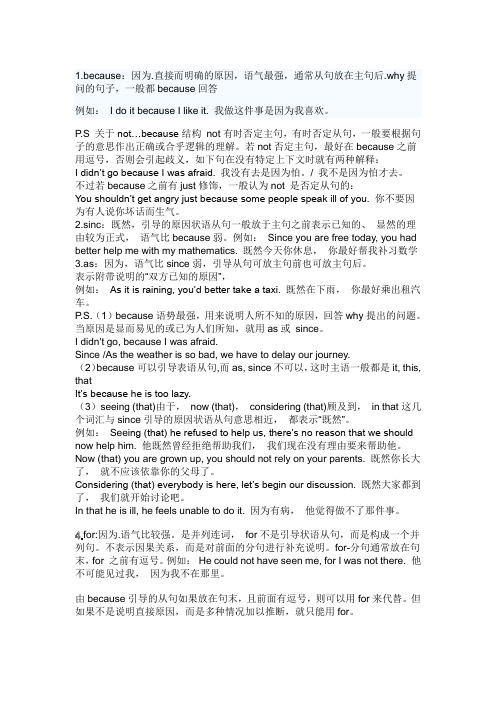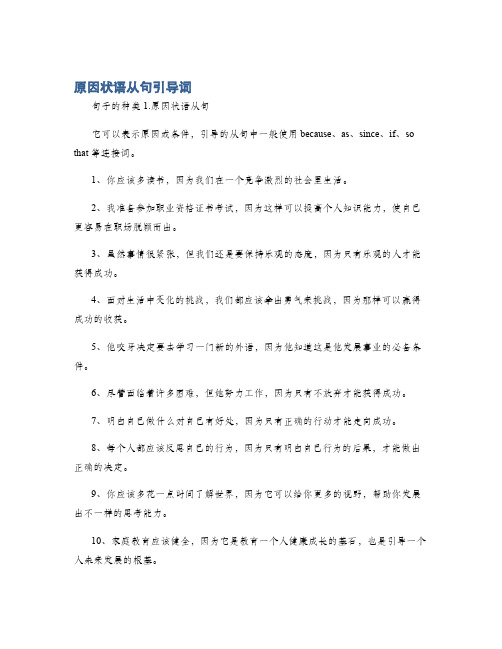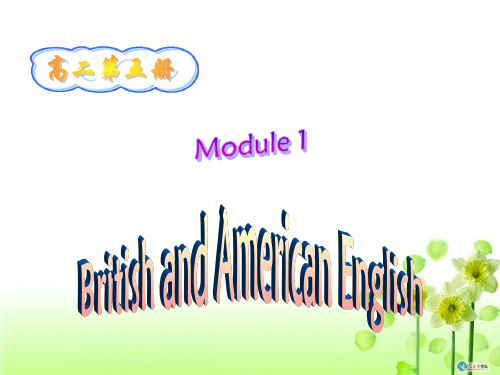原因状语从句精选
原因状语从句(完整)

原因状语从句(完整)
原因状语从句是一种从句,用来表示某种事件或情况的原因。
它通常由“因为”、“既然”、“由于”、“如果”等引导词开头,以下是一些常用的原因状语从句及其用法:
1.因为(because)
用法:因为引导的原因状语从句可以放在句首或句中,用来解释主句中的原因。
例句:因为他昨晚没睡好,今天一整天都很疲倦。
2.既然(since)
用法:既然引导的原因状语从句表示相信某个前提条件,因此陈述主句中的结果或结论。
例句:既然你已经完成了这项工作,我们就可以开始进行下一步了。
3.由于(due to)
例句:由于天气不好,我们无法进行户外活动。
4.如果(if)
例句:如果你需要帮助,尽管告诉我,我很乐意为你效劳。
5.只要(as long as)
例句:只要你好好学习,你就会成功。
6.尽管(even though)
例句:尽管天气不好,但我们仍然决定继续我们的计划。
7.虽然(although)
用法:虽然引导的原因状语从句表示一个与主句相反的情况,用来表达抱怨、惊讶等情绪。
例句:虽然我跟他说了很多遍,但他还是不肯听我的建议。
8.随着(as/with)
例句:随着科技的进步,我们的生活变得越来越便利。
总之,原因状语从句是一种非常重要的语法结构,它可以表达出各种事件或情况的原因,让句子的意思更加清晰明了。
希望通过以上的例句和用法介绍,能够帮助大家更好地掌握原因状语从句的用法。
原因状语从句

1.because:因为.直接而明确的原因,语气最强,通常从句放在主句后.why提问的句子,一般都because回答例如:I do it because I like it. 我做这件事是因为我喜欢。
P.S 关于not…because结构not有时否定主句,有时否定从句,一般要根据句子的意思作出正确或合乎逻辑的理解。
若not否定主句,最好在because之前用逗号,否则会引起歧义,如下句在没有特定上下文时就有两种解释:I didn’t go because I was afraid. 我没有去是因为怕。
/ 我不是因为怕才去。
不过若because之前有just修饰,一般认为not 是否定从句的:Y ou shouldn’t get angry just because some people speak ill of you. 你不要因为有人说你坏话而生气。
2.sinc:既然,引导的原因状语从句一般放于主句之前表示已知的、显然的理由较为正式,语气比because弱。
例如:Since you are free today, you had better help me with my mathematics. 既然今天你休息,你最好帮我补习数学3.as:因为,语气比since弱,引导从句可放主句前也可放主句后。
表示附带说明的“双方已知的原因”,例如:As it is raining, you’d better take a taxi. 既然在下雨,你最好乘出租汽车。
P.S.(1)because语势最强,用来说明人所不知的原因,回答why提出的问题。
当原因是显而易见的或已为人们所知,就用as或since。
I didn't go, because I was afraid.Since /As the weather is so bad, we have to delay our journey.(2)because可以引导表语从句,而as, since不可以,这时主语一般都是it, this, thatIt’s because he is too lazy.(3)seeing (that)由于,now (that),considering (that)顾及到,in that这几个词汇与since引导的原因状语从句意思相近,都表示“既然”。
原因状语从句精讲

原因状语从句精讲1.引导原因状语从句的连词有:because,since,as,now that,seeing that,considering that等。
(1)because 语气最强,表示必然的因果关系。
I was absent from the meeting because I was ill.我缺席会议了,因为我生病了。
(2)since语气稍弱,表示对方已知晓的原因或事实,意为“既然;由于”。
Since everybody is here,let's begin our meeting.既然大家都到场了,我们开始开会吧。
(3)as语气最弱,往往是不明显的原因,只是对结果的附带说明。
As it is raining,we shall not go to the park.因为下雨了,所以我们不能去公园。
(4)considering (that),seeing (that),now(that)和since的意义相似,都有“鉴于某个事实”的意思,that可以省去。
Considering (that)everybody is here,let's begin our discussion.鉴于大家都到场了,我们开始讨论吧。
Now(that)you have grown up,you should not rely on your parents.鉴于你已经长大成人,你不应该依赖你父母了。
2.其他表示原因的方式除了状语从句外,一些介词短语同样可以表示原因,这样的短语有:because of,thanks to,due to,owing to等。
Because of the weather,we had to put off the sports meeting.由于天气原因,我们不得不推迟运动会。
原因状语从句专项训练

原因状语从句专项训练1.由于下雨,我们取消了户外野餐计划。
- We cancelled the outdoor picnic plan because it was raining.2.他晚到了,因为他在练习音乐。
- He was late because he was practicing music.3.因为她生病了,她没有参加聚会。
- She didn't attend the party because she was sick.4.由于机票太贵,他决定不去旅行。
- He decided not to travel because the airfare was too expensive.5.他没有通过考试,因为他没有好好复习。
- He didn't pass the exam because he didn't study well.6.他错过了火车,因为他起床太晚了。
- He missed the train because he woke up too late.7.我们没有去那个餐馆,因为它太贵了。
- We didn't go to that restaurant because it was too expensive.8.由于他犯了错误,他被开除了。
- He was fired because he made a mistake.9.她错过了演唱会,因为她忘记了买票。
- She missed the concert because she forgot to buy tickets.10.张先生没能出席会议,因为他生病了。
- Mr. Zhang couldn't attend the meeting because he was sick.。
原因状语从句引导词

原因状语从句引导词
句子的种类 1.原因状语从句
它可以表示原因或条件,引导的从句中一般使用because、as、since、if、so that 等连接词。
1、你应该多读书,因为我们在一个竞争激烈的社会里生活。
2、我准备参加职业资格证书考试,因为这样可以提高个人知识能力,使自己更容易在职场脱颖而出。
3、虽然事情很紧张,但我们还是要保持乐观的态度,因为只有乐观的人才能获得成功。
4、面对生活中变化的挑战,我们都应该拿出勇气来挑战,因为那样可以赢得成功的收获。
5、他咬牙决定要去学习一门新的外语,因为他知道这是他发展事业的必备条件。
6、尽管面临着许多困难,但她努力工作,因为只有不放弃才能获得成功。
7、明白自己做什么对自己有好处,因为只有正确的行动才能走向成功。
8、每个人都应该反思自己的行为,因为只有明白自己行为的后果,才能做出正确的决定。
9、你应该多花一点时间了解世界,因为它可以给你更多的视野,帮助你发展出不一样的思考能力。
10、家庭教育应该健全,因为它是教育一个人健康成长的基石,也是引导一个人未来发展的根基。
原因状语从句

Exercises
1. It is useful to learn English _b_e_c_a_u_s_e_/_a_s_ it is spoken all over the world.
2. _A_s_/_S__in_c_e_ they see lots of American films, the British are used to American accents.
1 Which word do we use more often
to introduce a reason? Because.
2 Which expression shows that a
situation has changed? Now that.
3 Which two words often come at the
1. I like Leeds because there’s more going on here than back home in the States.
2. Since English is spoken all over the world, there are lots of varieties.
3. Americans like the British accent b_e_c_a__us_e_ they think it is cute.
4. It’s easier to compare British and American English n_o_w___th_a__t we have the Internet.
as: 由于,鉴于,主从并重;从句 说明原因,主句说明结果;一般放在 主句前。
英语原因状语从句
英语原因状语从句
英语中的原因状语从句用来表示件事情发生的原因或理由。
在原因状
语从句中,常常使用以下引导词:
1. because: 因为
2. since: 因为
3. as: 由于;因为
4. given that: 鉴于;由于
5. seeing that: 鉴于;由于
6. considering (that): 考虑到;鉴于
7. due to: 由于;因为
8. owing to: 由于;因为
例如:
- Since it's raining outside, we should bring umbrellas. (由
于外面在下雨,我们应该带雨伞。
- As he had already left, I couldn't give him the message. (由于他已经离开了,所以我不能给他传达消息。
)
- Given that it's late, we should go home now. (鉴于已经很晚,我们现在应该回家了。
)
- Considering the price, this car is a good deal. (考虑到这
个价格,这辆车是个不错的交易。
)
- Due to bad weather, the flight was cancelled. (由于恶劣的
天气,航班被取消了。
)
- Owing to his hard work, he was promoted. (由于他的努力工作,他得到了晋升。
常用句型之十七原因状语从句
常用句型之十七原因状语从句原因状语从句是英语中常用的一种从句类型,可以对一个事件或情况进行解释,说明其背后的原因。
本文将介绍常见的原因状语从句句型,并通过例句来展示其用法。
原因状语从句通常由连词“because”、“since”、“as”、“due to”、“owing to”、“on account of”等引导。
句型一:(主句)+ because + (从句)例句:She couldn't come to the party because she was sick.她不能参加派对,因为她生病了。
He failed the exam because he didn't study enough.他考试不及格是因为他没有好好学习。
句型二:(主句) + since + (从句)例句:I have been feeling tired since I started my new job.自从我开始新工作以来,我一直感到疲倦。
He has been acting strangely since he broke up with his girlfriend.自从他和女朋友分手以来,他一直行为奇怪。
句型三:(主句) + as + (从句)例句:As it was getting late, we decided to leave.因为天色已晚,我们决定离开。
He couldn't find his keys as he had left them in the car.他找不到钥匙,因为他把它们落在了车里。
句型四:(主句) + due to + (从句)例句:The flight was delayed due to bad weather conditions.航班因天气恶劣而延误。
He was unable to attend the meeting due to a family emergency.因为家庭紧急情况,他无法参加会议。
原因状语从句-
So 强调的是形容词
• such…that “如此的…以致于”表结 果。 1.such+a(an)+形+可数名词 单数+that 2.such+形+复数名词/不可数名词+
that
• Such 强调的是名词
18
so…that / such…that
• 她是如此的疲惫, 以致于很快就睡着了。
•
She wasso_t_ir_e_d__t_h_a_t____ shfeell asleep
可数名词 不可数名词 Soon there were so many people that they ate all the food.
He has so little time that he can’t go to the cinema with you.
15
such…that “如此的…以致于”表结 果1.。such+a(an)+形+可数名词名词单数 +that Mr Green is such a good teacher that everybody likes him. It was such an interesting film that everyone laughed.
Since you are free today, you had better help me with my maths. 既然今天你休息, 你最好帮我补习数学。
6
大家有疑问的, 可以询问和交流
可以互相讨论下, 但要小声点
7
关于as as 引导原因状语从句时表示附带说明的“双方已知的原因”, 语气比since弱, 较为正式, 位置较为灵活(常放于主句之前)。
12
so....that 如此......以致于 1.so+形/副+that
2024年初中英语语法复习之原因状语从句知识点归纳
2024年初中英语语法复习之原因状语从句知识点归纳原因状语从句是一种用来说明某个事件发生的原因或理由的从句。
在英语中,原因状语从句通常用连词because、as、since、for、if等引导。
以下是几种常见的原因状语从句:because型例如:I didn’t go to the party because I had a headache. 在这个句子中,because表示原因。
as型例如:As I was walking home, I saw a man fall down on the street. 在这个句子中,as表示原因。
since型例如:I haven’t been to the gym for two weeks since I started working out. 在这个句子中,since表示原因。
for型例如:I stayed at home for the whole day because I was feeling sick. 在这个句子中,for表示原因。
if型例如:If I don’t study hard, I won’t pass the exam. 在这个句子中,if表示原因。
需要注意的是,原因状语从句的使用需要符合语法规则,同时也需要考虑逻辑关系和语境。
在使用原因状语从句时,需要避免重复使用同一个连词,否则会影响文章的连贯性和流畅性。
定语从句和原因状语从句的区别是什么?定语从句和原因状语从句都是英语中常见的从句类型,它们的区别在于:定语从句用来修饰名词或代词,说明它所代表的事物的性质、特征、状态等;而原因状语从句用来说明某个事件发生的原因或理由。
定语从句通常用逗号与主句分开,并且关系代词或关系副词是不能省略的;而原因状语从句通常用连词引导,可以与主句合并成一个完整的句子。
定语从句的作用是补充说明主句中的名词或代词,起到修饰作用,不改变主句的意思;而原因状语从句的作用是说明主句发生的原因或理由,对主句的意思产生影响。
- 1、下载文档前请自行甄别文档内容的完整性,平台不提供额外的编辑、内容补充、找答案等附加服务。
- 2、"仅部分预览"的文档,不可在线预览部分如存在完整性等问题,可反馈申请退款(可完整预览的文档不适用该条件!)。
- 3、如文档侵犯您的权益,请联系客服反馈,我们会尽快为您处理(人工客服工作时间:9:00-18:30)。
原因状语从句原因状语从句表原因,引导原因状语从句的从属连词主要的有because, as, since, for,seeing (that), now (that), considering (that),in that等。
以下逐一介绍常见的原因状语从句的引导词:because引导的原因状语从句一般放于主句之后, because表示直接原因,语气最强,最适合回答 why引导的疑问句。
例如: I do it because I like it. 我做这件事是因为我喜欢。
注意:“not ... because”结构中的not否定的是because引导的整个从句,例如: The country is not strong because it is large. 国强不在大。
since引导的原因状语从句一般放于主句之前表示已知的、显然的理由(通常被翻译成“既然”),较为正式,语气比because弱。
例如: Since you are free today, you had better help me with my mathematics. 既然今天你休息,你最好帮我补习数学。
注意: seeing (that), now (that), considering (that), in that这几个词汇与since 引导的原因状语从句意思相近,都表示“既然”。
例如: Seeing (that) he refused to help us, there’s no reason that we should now help him. 他既然曾经拒绝帮助我们,我们现在没有理由要来帮助他。
Now (that) you are grown up, you should not rely on your parents. 既然你长大了,就不应该依靠你的父母了。
Considering (that) everybody is here, let’s begin our discussion. 既然大家都到了,我们就开始讨论吧。
In that he is ill, he feels unable to do it. 因为有病,他觉得做不了那件事。
as 引导原因状语从句时表示附带说明的“双方已知的原因”,语气比since弱,较为正式,位置较为灵活(常放于主句之前)。
例如: As it is raining, you’d better take a taxi. 既然在下雨,你最好乘出租汽车。
As you are tired, you had better rest. 既然累了,你最好休息一下。
I went to bed early, as I was exhausted. 我睡得早,因为我筋疲力尽了。
for引导的原因状语从句并不说明主句行为发生的直接原因,只提供一些辅助性的补充说明, for引导的原因状语从句只能放于主句之后并且必须用逗号将其与主句隔开。
例如: He could not have seen me, for I was not there. 他不可能见过我,因为我不在那里。
比较:because, since, as和forbecause语势最强,表示不知道的原因用because,即说话人认为听话人不知道。
因此because 从句是全句最重要的部分,通常被放置于主语之后。
当原因是显而易见的或已为人们所知,就用as或 since。
I didn't go, because I was afraid.Since /As the weather is so bad, we have to delay our journey.for虽然表示不知道的原因,但因语气比because弱得多,是可说可不说的话,只能位于主语之后,这时,for是并列连词,如果不是因果关系,而是对前面主语内容加以解释或推断时,只能用for。
He is absent today, because / for he is ill.He must be ill, for he is absent today.注1:除以上提到的大家比较熟悉的引导原因状语从句的从属连词外,when有时也可引导原因状语从句(when表示“既然”)I won’t tell you when you won’t listen. 既然你不想听,我就不告诉你了。
注2:because习惯上不与so连用汉语习惯上说“因为…所以…”,但英语习惯上却不能将 so与because 连用:因为下雨,所以我们呆在家里。
正:Because it was raining, we stayed at home. / It was raining, so we stayed at home. 误:Because it was raining, so we stayed at home.注3:because 从句与 because of短语的转换Because引导的原因状语从句有时可与because of 短语转换,because of后加的原因可以为好或坏但最正规的还是becauseHe can’t come because he is ill. / He can’t come because of his illness. 他因病不能来。
I said nothing about it because his wife was there. / I said nothing about it because of his wife’s being there. 因为他妻子在那儿,我对此事只字未提。
[考题1] ____ you’ve got a chance, you might as well make full use of it.A. Now thatB. AfterC. AlthoughD. As soon as[答案] A[解析] 主句与从句之间存在因果关系,且“you’ve got a chance”表示一个显而易见的原因,因此应选用表原因的now that。
[考题2] He found it increasingly difficult to read, ____ his eyesight was beginning to fail.A. andB. forC. butD. or[答案] B[解析] “his eyesight was beginning to fail”是“he found it increasingly difficult to read”的原因,因此本题应选用可以表示原因的连词for引导原因状语从句。
[考题3] A man cannot smile like a child, ____ a child smiles with his eyes, while a man smiles with his lips alone.A. soB. butC. andD. for[答案] D[解析] 下划线处之后的句子补充说明“a man cannot smile like a child”的原因,应选用for表原因。
原因状语从句练习题I. 在下列句子的空格中填入适当的连词(每空一词):1. ________ Jane was the eldest, she looked after the others.2. ________ you know it, I won't repeat it.3. He didn't hear the knock at the door ________ he was listening to the radio.4. —Why didn't you come?— ________ my father wouldn't let me.5. ________ ________ everybody is here, let's begin the discussion.II. 句型转换(把下列复合句转换为简单句):I)把从句简化为 because of 结构:1. He lay in bed because he had caught a bad cold.2. He couldn't walk because his leg was broken.3. I came back because it was raining.4. They stayed in because the weather was bad.5. We didn't get home till after midnight because we had missed the bus.II)把从句简化为分词短语:6. As he is a warmhearted man, he is always ready to help others.7. As he saw nobody in, he decided to leave a note.8. Because he didn't understand its meaning, he asked the teacher to explain the word.9. As he had lived in Beijing for many years, he knew the city very well.10. As I have not seen the film, I can't tell you what I think of it.11. As they were influenced by Lei Feng's example, they did a lot of good deeds.12. As he was brought up in the countryside, he was not used to the city life.III)把从句简化为形容短语:13. Because he was afraid of being late for class, Bob ran to school as fast as he could.14. As he was full of ear, Crusoe left the cave in a hurry.15. As he was anxious for a quick decision, the chairman called for a vote.Key:I. 1. As 2. Since 3. because 4. Because 5. Now that/Seeing thatII. 1. He lay in bed because of a bad cold.2. He couldn't walk because of a/his his broken leg.3. I came back because of the rain.4. They stayed in because of the bad weather.5. We didn't get home till after midnight because of missing the bus.6. Being a warm-hearted man, he is always ready to help others.7. Seeing nobody in, he decided to leave a note.8. Not understanding its meaning, he asked the teacher to explain the word.9. Having lived in Beijing for many years, he knew the city very well.10. Not having seen the film, I can't tell you what I think of it.11. Influenced by Lei Feng's example, they did a lot of good deeds.12. Brought up in the countryside, he was not used to the city life.13. Afraid of being late for class, Bob ran to school as fast as he could.14. Full of ear, Crusoe left the cave in a hurry.15. Anxious for a quick decision, the chairman called for a vote.(注:专业文档是经验性极强的领域,无法思考和涵盖全面,素材和资料部分来自网络,供参考。
